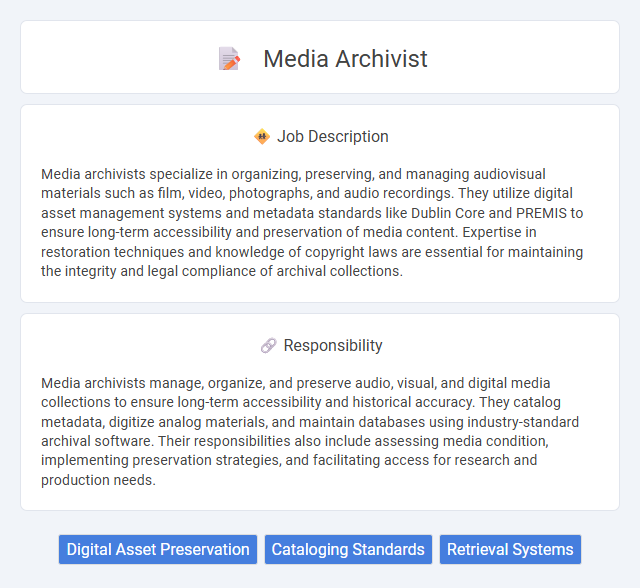
Media archivists specialize in organizing, preserving, and managing audiovisual materials such as film, video, photographs, and audio recordings. They utilize digital asset management systems and metadata standards like Dublin Core and PREMIS to ensure long-term accessibility and preservation of media content. Expertise in restoration techniques and knowledge of copyright laws are essential for maintaining the integrity and legal compliance of archival collections.
Individuals with strong attention to detail and a passion for organizing historical content are likely well-suited for a media archivist role. Those who prefer structured environments and enjoy working with digital cataloging systems may find this job fulfilling. Candidates who thrive in preserving media quality and possess patience for meticulous tasks probably have a higher probability of success in this career.
Qualification
A Media Archivist must possess strong organizational skills and extensive knowledge of digital and analog media formats for efficient cataloging and preservation. Proficiency in database management systems, metadata standards such as Dublin Core, and digital asset management software is essential. A background in library science, archival studies, or media technology, often supported by a relevant degree or certificate, significantly enhances job performance and career prospects.
Responsibility
Media archivists manage, organize, and preserve audio, visual, and digital media collections to ensure long-term accessibility and historical accuracy. They catalog metadata, digitize analog materials, and maintain databases using industry-standard archival software. Their responsibilities also include assessing media condition, implementing preservation strategies, and facilitating access for research and production needs.
Benefit
Media archivist jobs likely offer significant benefits such as preserving valuable historical and cultural content, which can provide a strong sense of professional fulfillment. There is a high probability of gaining expertise in digital asset management and archival technologies, enhancing career development opportunities. Employment in this role may also offer a stable work environment within museums, media companies, or academic institutions, contributing to job security.
Challenge
Working as a media archivist likely involves navigating the challenge of preserving diverse formats that rapidly become obsolete due to technological advancements. The role probably demands meticulous attention to detail to ensure accurate cataloging and retrieval of vast amounts of digital and analog content. Adapting to evolving metadata standards and digital asset management systems might also pose ongoing difficulties in maintaining seamless access and long-term preservation.
Career Advancement
Media archivists play a crucial role in organizing, preserving, and managing valuable audiovisual collections, which opens pathways to senior archival positions and specialized roles in digital asset management. Expertise in metadata standards, digital preservation technologies, and legal compliance enhances prospects for advancement to lead archivist or media curator positions. Continuous skill development in emerging media formats and data recovery techniques is essential for career growth within museums, libraries, and broadcast organizations.
Key Terms
Digital Asset Preservation
Media archivists specializing in digital asset preservation manage and safeguard digital media collections through advanced metadata tagging and format migration techniques. They implement robust digital preservation strategies, including regular backups, checksum validations, and adherence to industry standards like OAIS and PREMIS. Expertise in digital repository software and cloud storage solutions ensures long-term accessibility and integrity of valuable media assets.
Cataloging Standards
Media archivists utilize industry-standard cataloging frameworks such as Dublin Core, PBCore, and MARC to systematically organize audiovisual collections. These standards enable efficient metadata creation, ensuring accurate asset retrieval and long-term preservation. Mastery of controlled vocabularies and persistent identifiers enhances interoperability across digital archives and library systems.
Retrieval Systems
Media archivists specialize in managing and preserving digital and physical media collections through advanced retrieval systems designed for efficient access and organization. Utilizing metadata standards, indexing, and database management tools, they optimize searchability and ensure the long-term accessibility of audiovisual materials. Expertise in digital asset management software and retrieval algorithms enhances the ability to quickly pinpoint specific content within vast archives.
 kuljobs.com
kuljobs.com